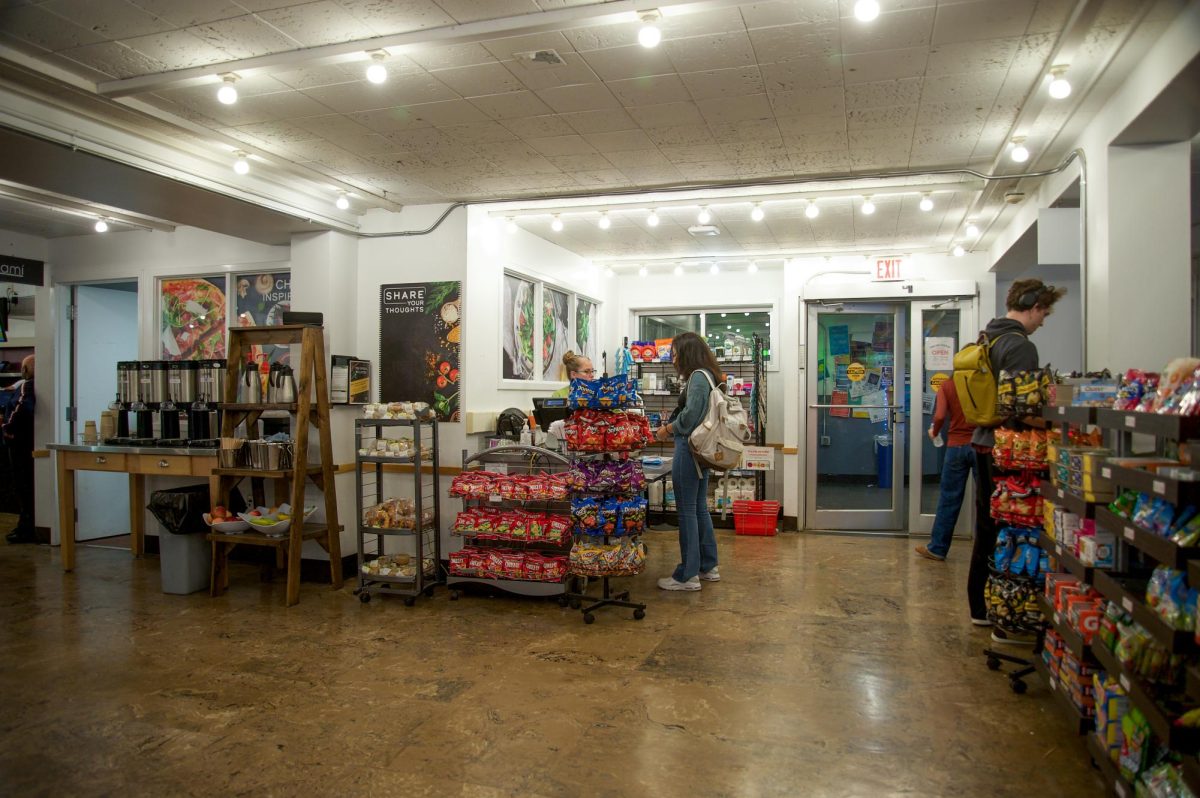In November 2022, the federal government through the Board of Education mandated that every institution of higher education receiving government money must provide three meals a day or allowances for three meals a day for every student living in college-owned or -controlled housing. Under Oberlin’s previous system, the only meal plan that met the requirements of the mandate was the GoYeo meal plan.
In the past, students have had the option to choose from three meal plans depending on class year. Now, students can choose from two top-priced plans (GoYeo or Gold) or one lower-priced meal plan (Cardinal), only available to students who have completed three or more years or who live in Village Housing. The GoYeo plan includes 420 meal swipes and 200 Flex Dollars. The Gold plan, which costs the same as the GoYeo includes 315 meal swipes and 600 Flex Dollars. The Cardinal plan, the cheapest option, provides 100 meal swipes and 100 Flex Dollars.
Mark Zeno, assistant vice president and dean of Residence Life and Auxiliary Services, discussed the reasons the meal plans have changed in an email to the Review.
“There needed to be another plan that upper-class students could elect into, which is why the Gold plan (usually [third-years and fourth-years]) could elect into without having the highest priced plan option only,” Zeno wrote. “Now, GoYeo and Gold have a similar pricing structure, but the Gold plan has fewer swipe options but a significantly higher flex dollar allotment.”
Students also now have the option to purchase additional “Block Plans,” which allow them to buy an additional 20 or 50 meal swipes should they run out before the end of the semester.
Zeno said the Block Plans were developed when administration learned that students were running out of swipes towards the end of the semester.
“Since many of the students who faced swipe shortages were between 20–50 swipe deficient, it made more sense to come up with smaller blocks for students to purchase than to move them to a more costly plan,” Zeno wrote.
Zeno also said that Block Plans allowed employees and staff to access dining without having to pay at the door or pay for an entire meal plan.
Another major change for students in these meal plans is the option to swipe seven times per day. In previous years, the top meal plan capped daily meal swipes at four.
College fourth-years Claire Vallely and Amelia Bronfman agreed that the flexibility of the new plan was something they both enjoyed.
“It’s nice to have flexibility of when you use it,” Bronfman said. “With [the tennis] team, we go away for the weekend a lot, so I don’t use any meals, and I can save those for another time, so that’s nice.”
Vallely felt similarly.
“Personally, I like being able to use up to seven meal swipes a day because often on weekends, I will make food at home, so I don’t use all four meals,” Vallely said. “Now, during the week, I can restock on snacks and not have to worry about running out when something unexpectedly uses more than one swipe.”
Biggs GoYeo, a smoothie bar located underneath Stevenson Dining Hall, has been shut down permanently. According to Sarirose Hyldahl, director of operations for AVI Oberlin, this was due to lack of office space. She said that AVI Foodsystems is looking for a new home for Biggs in the future.
“It ultimately came down to the need for office space for ResLife,” she said. “It was not a decision that we had really any part in. We’ve been trying to have smoothies in Stevie, and we do have plans for smoothie pop ups and other beverage-centered popups around campus as the school year goes on.”
Another change to campus dining is the implementation of mobile ordering at the Rathskeller, Umami, and Azariah’s Café. Mobile ordering has completley replaced kiosks at The Rathskeller and has been added to Umami and Azzie’s as a supplement. The option to place mobile orders was first rolled out during the Spring 2023 semester.
According to Hyldahl, mobile ordering originally came about through a system update.
“We were transitioning to the new system … and they had mobile ordering, which seemed like a great idea,” Hyldahl said. “We have lines and lines of students everywhere, so we thought it’s going to eliminate that and eliminate all that wait time.”
According to Hyldahl, the system has been a success so far.
“We’ve had positive feedback so far from everyone. Our employees like it, the students like it for the most part,” she said. “I feel like most students appreciate not having to stand and wait in line.”
Rathskeller employee Sherri Albright mentioned the benefits of mobile ordering over a past system which required staff to call out student names.
“You’re not calling names, you’re not calling anything,” Albright said. “You’re just making the order, setting it up, and they come and look for it, so I like it.”
However, some students have encountered certain drawbacks from the system. Vallely noted that the timer which notifies students when their food will be ready has been somewhat glitchy, undercutting some of the efficiency that the system provides. Bronfman mentioned disliking how mobile ordering has decreased the human interaction needed for getting food.
“I used to go in the Rat and have a whole conversation with the people working there every single day,” Bronfman said. “Now, because everything is more streamlined, that doesn’t really happen anymore, so I think it takes that moment of connection away.”
Additionally, the Rathskeller no longer provides seating for students to eat in the dining hall. According to Hyldahl, this was changed in order to accommodate a lack of storage space.
“It kind of made sense because mobile ordering is really geared for to-go kind of stuff,” she said. “With the new meal plan that has all that Flex, we were concerned about storage space in general for the volume that we were going to start to see.”
Albright mentioned that, despite the lack of seating and fully-mobile ordering, she’s been hearing positive feedback about the service all around.
“We still get that positive vibe,” Albright said. “[The students] love our food, they love our service, so we’ll take it.”










